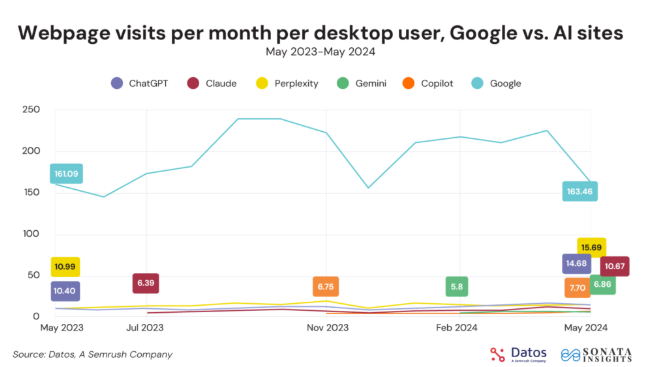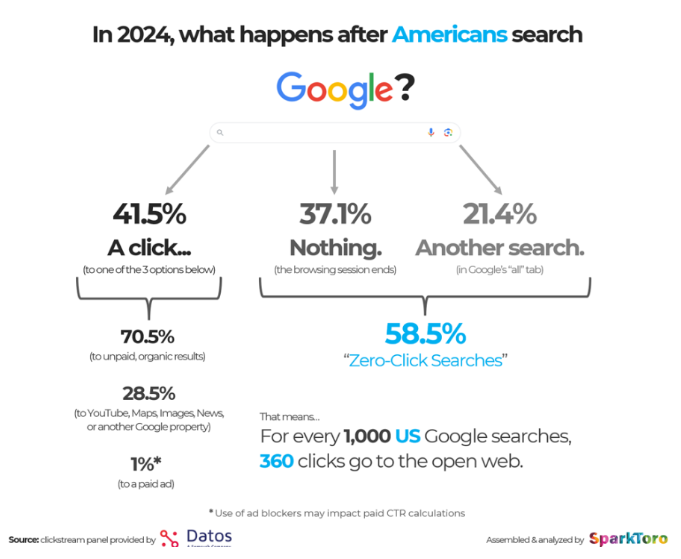Back in June of 2011, a social network by the name of Google+ officially launched. This newcomer to the nascent social media space was hailed as the next big thing, and early results seemed to validate the hype.
Headlines wondered: “Can Google+ be a Facebook killer?” The platform amassed 10 million users within two weeks of launching. It had plenty of things going for it: the vaunted Google brand name, full integration across the provider’s suite of products, and a slick set of features and functions.
Less than 15 years later, Google+ is gone and faded from memory. Just one of many “next big things” throughout history that never quite lived up to the lofty initial projections and prognostications. Which brings us to the topic of Google, AI, and user search habits.
The impact of generative AI on organic search: So far, minimal
There has been a lot of buzz about the rise of AI search tools and features, and their potential impact on organic search traffic. This may in fact be the No. 1 line of questioning we receive from clients and prospects these days: How should we adapt our SEO strategy in the age of AI search?
It’s true that more people are turning to generative AI platforms like ChatGPT, Copilot, and Perplexity to find information and answer questions. It’s also true that AI Overviews are changing the makeup of Search Engine Results Pages (SERPS) on Google, and often pushing top-ranked organic listings down.
However, the actual impact of these changes on search behaviors has — so far — been smaller than you might think.
A new whitepaper from Datos found that while Perplexity has emerged as the top LLM (large language model) search engine, experiencing 42% growth from May of 2023 to May of 2024, Google still had 290x the number of search users, and its market share remained consistent over the course of the year.

(Source: Consumer Search Behavior: What’s Changing and What’s Not in the Age of AI?)
The research highlighted two key insights:
- Traditional search users aren’t migrating to AI search en masse: The percentage of traditional search engine users who also use AI platforms grew only 2 points over the course of a year.
- AI search users are still turning to traditional search: 99% of AI platform users still used traditional search engines
People continue to predominantly leverage Google for search. But that doesn’t mean they are clicking through to organic results as frequently, or that these results are still being displayed the same way.
Rise of the zero-click search
While searchers are still using Google, they aren’t necessarily taking the same actions when they arrive. Research from Datos and SparkToro found that in 2024, only 41.5% of Google searches in the U.S. result in a click, and even then only a fraction are going to unpaid organic results as opposed to a Google property or paid ad. Well over half are “zero-click searches,” often occurring because their question was answered without the need to visit another page.

(Source: 2024 Zero-Click Search Study)
If your website has seen a downward trend in traffic acquisition from organic search, this is likely a big part of the reason. But the bottom line is that while user behavior within Google has changed – and you can react by optimizing content for AI snapshots and featured snippets – the overall usage of the search platform really hasn’t.
Lessons from the Google+ hype cycle
Let’s be totally clear here: I am NOT suggesting that we will be talking about AI search in the past tense 10 years from now, like we do with Google+. That would be simply naive. But I do think there are some lessons to be drawn here from the hype machine and how it can warp our perceptions or expectations.
These are a few things I’m keeping in mind as I assess the future of AI search platforms and Google’s position.
The durability of established habits.
From a functionality and experience standpoint, it may be true that Google+ had a lot going for it relative to established platforms like Facebook. But what it did not have was a large user base already accustomed to using it.
Although social media networks are used by an estimated 64% of the world’s population, very few newcomers have been able to break through and join the tier of most widely-used platforms, and certainly no one has come close to threatening Facebook’s dominance.
AI search can provide a really excellent experience, and you can certainly argue a superior one to Google for many types of queries. But internet users have been conditioned for 20 years to run Google searches and peruse results on the SERP. It’s comfortable and familiar.
Customers don’t want new products forced upon them.
One thing I remember about the Google+ launch is how invasive it felt. The new platform plussed itself into other Google products like Gmail, YouTube and Google Docs, often triggering users to create accounts unknowingly in what’s been described as a “brute force signup process.” I found this off-putting, and I know I’m not alone.
In a similar way, today it can feel like AI tools and features are being thrust upon us everywhere, often when people aren’t asking for them. Consumers are already expressing varying levels of burnout. For example, per a new survey from CNET:
“As smartphone makers like Apple, Google and Samsung place a growing emphasis on AI features in their latest devices, a CNET survey found a quarter of smartphone owners don’t find those capabilities particularly useful, and just 18% say AI integrations are their main motivator for upgrading their phone.”
The value of a specialized reputation.
Google failed to make a dent in social media, in part, because it failed to differentiate its offering from the market leader. Unlike social networks such as Instagram and Pinterest and Twitter, which served their own distinct purposes, Google+ had major overlap with Facebook: facilitating online connections and social networking. As one former Google engineer shared on Quora, Google+ “failed because ‘like Facebook, but owned by Google’ does not make a compelling product.”
Facebook had significant authority in the social media space. Google lacked that, but they do have plenty of authority when it comes to search. While AI search tools can undoubtedly bring a lot of value to the search experience, data makes clear that right now, users view them as additive to Google rather than replacements.
With billions of indexed pages, an evolving people-centric algorithm, and a long track record of helping folks find what they’re looking for, Google has a stronghold as the standard in search.
The future of AI and search
It’s wise to proactively adapt your SEO strategy to the growing imprint of AI search tools and features. They’re not going away. But they’re also not dominating the landscape for online content discovery, and it doesn’t appear they will be soon.
Google remains a kingpin in search, and smart SEO strategies will continue to prioritize gaining visibility there – especially because the E-E-A-T principles of helpful, reliable, people-first content will help your brand show up and drive engagement with audiences across all channels.
Learn more with our in-depth guide to B2B search engine optimization, or explore TopRank Marketing’s SEO services to turn knowledge into action and results.



